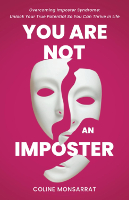
Image by Ben Kerckx
Imagine, if you will, life as a grand meeting room. It’s filled with people from all walks of life, each bringing their unique experiences and contributions to the table. But just as you’re about to stand up and voice your idea, a shadow of doubt creeps in. Is your idea good enough? Do you even belong in this room?
Welcome to the invasive world of imposter syndrome, a psychological phenomenon that doesn’t play favorites but certainly has unique methods of infiltration depending on one’s gender identity.
A 2019 report from Access Commercial Finance indicates that a substantial 62 percent of individuals grapple with imposter syndrome at work. The nuances are even more intriguing: a notable 66 percent of women have grappled with these feelings compared to 56 percent of men.
Imposter Syndrome: One Size Does Not Fit All
Imposter syndrome, however, doesn’t manifest uniformly across genders. Women, especially those in high-achieving categories, face a unique interplay with imposter syndrome. According to the extensive work of Clance and Imes, these accomplished women, influenced by historical stereotypes and societal pressures, tend to attribute their successes to external and fleeting factors like luck rather than acknowledging their innate capabilities. This is further compounded by long-standing societal beliefs that have conditioned many women to downplay their achievements.
Men, in contrast, grapple with societal expectations of being unwavering pillars of knowledge and confidence, amplifying their own self-doubts when they don’t feel they measure up to this ideal.
The implications for both genders are profound. For women, successes often get attributed to chance or external help, while failures are internalized as a lack of ability. Conversely, men often externalize failure as bad luck or task difficulty, further perpetuating gendered perceptions in professional and personal arenas.
In essence, these ingrained beliefs, deeply rooted in societal constructs and expectations, often determine our self-view, affecting how we perceive our successes and failures. But acknowledging this pattern is the key to flipping the script. What’s more, science has our back in this battle against self-doubt.
Six Ways to Train Your Brain into Confidence
Let’s explore ways to train our brain so we can stride confidently into life’s grand meeting room project our voice with conviction and aplomb.
1. Master the mind by reconfiguring your brain’s circuitry
Our brains contain an extraordinary feature. Their neuroplasticity allows them to restructure by forming new neural connections. When confronting and challenging the distorted beliefs associated with imposter syndrome, you harness this power and reshape the thought processes underlying the syndrome. Envision this as a seating reshuffle in our hypothetical meeting room to amplify your role in the discussion.
2. Trace the origins of your imposter syndrome
Cognitive psychology highlights that our past often pulls the strings associated with our present beliefs. Delve deep and try to identify these historical culprits. Doing so can help neutralize their influence on your current way of thinking.
3. Embrace the Socratic method of questioning self-doubts
Doubts, quite often, stand on shaky ground. Subject them to rigorous analysis. In our metaphorical meeting space, adopt a fact-checking approach: demand substantial evidence before agreeing. It’s crucial to be aware of a sneaky cognitive bias: our brains have a knack for spotting evidence that backs our pre-existing beliefs. An external lens on internal thoughts can help counter this. Documenting these reflections can further sharpen new insights.
4. Ditch comparisons and celebrate your individual journey
Our inclination to draw comparisons has roots in evolutionary psychology, tracing back to times when such yardsticks determined survival. In today’s layered world, such juxtapositions more often hinder than help. Recognize that every person in our grand meeting room has navigated a unique path enriched by diverse life lessons. There’s no need for your glow to be overshadowed by someone else’s moment in the limelight.
5. Relish your achievements and chronicle your wins
Take a moment to bask in your successes, irrespective of their scale. As per behavioral psychology, positive nods amplify desired behaviors. By spotlighting our victories, we fuel our confidence, ensuring we’re not just attendees but active contributors in our successes. Pro-tip: Create a “success folder.” Whenever self-doubt clouds your judgment, a quick revisit can be the confidence builder you need.
6. Seek a mentor or peer feedback to help navigate through the fog
The guiding hand of an insightful mentor can drastically diminish imposter syndrome’s obfuscation. Alternatively or in addition, actively seek feedback from trusted peers that will provide an unfiltered mirror to reflect your true worth and positioning inside the grand meeting room.
Flip the Script: Your Voice Counts
Recognizing and understanding imposter syndrome’s origins and faulty self-judgment is your way to flip the script. We’re all unique in our journey, replete with successes, setbacks, and learning curves. But it’s essential to remember that most people, irrespective of gender or profession, have faced this spectral doubt at some point.
With insight, introspection, and the above strategies, we can all stand tall, own our achievements, and ensure our voices resonate with unwavering confidence. Because in life’s grand meeting room, every idea matters and every voice counts. And we all unequivocally belong.
Copyright 2023. All Rights Reserved.
Book by this Author: You Are Not an Imposter
You Are Not an Imposter: Overcoming Imposter Syndrome: Unlock Your True Potential So You Can Thrive in Life
by Coline Monsarrat
 Do you ever feel like a fraud, fearing that others will discover you're not as competent or deserving as they think? You're not alone. Imposter syndrome affects a staggering 70% of people at some point in their lives. But what if you could break free from its grip and live with confidence and authenticity?
Do you ever feel like a fraud, fearing that others will discover you're not as competent or deserving as they think? You're not alone. Imposter syndrome affects a staggering 70% of people at some point in their lives. But what if you could break free from its grip and live with confidence and authenticity?
Part memoir, part guide, this transformative book uncovers how imposter syndrome silently infiltrates various areas of our lives. From sabotaging our careers to undermining our well-being, its impact is far-reaching and often underestimated. Coline Monsarrat dives into the science behind the condition, unraveling the psychological mechanisms that give rise to self-doubt, perfectionism, low self-esteem, and people-pleasing tendencies. Coline offers practical strategies derived from her personal journey, equipping readers with the tools to break free from imposter syndrome's grasp.
For more info and/or to order this book, click here. Also available as an audiobook, Hardcover, and a Kindle edition.
About the Author
 Coline Monsarrat is a passionate author driven by a mission to help others thrive. She weaves captivating stories that transcend boundaries. Whether through her insightful nonfiction work or the adventure MG book series, Aria & Liam, she imparts valuable wisdom that inspires readers to overcome challenges and embrace their potential. Her new book, You Are Not an Imposter: Overcoming Imposter Syndrome: Unlock Your True Potential So You Can Thrive (Apicem Publishing, April 11, 2023), offers a powerful and personal exploration of this all-too-common condition. Learn more at youarenotanimposter.com.
Coline Monsarrat is a passionate author driven by a mission to help others thrive. She weaves captivating stories that transcend boundaries. Whether through her insightful nonfiction work or the adventure MG book series, Aria & Liam, she imparts valuable wisdom that inspires readers to overcome challenges and embrace their potential. Her new book, You Are Not an Imposter: Overcoming Imposter Syndrome: Unlock Your True Potential So You Can Thrive (Apicem Publishing, April 11, 2023), offers a powerful and personal exploration of this all-too-common condition. Learn more at youarenotanimposter.com.

























